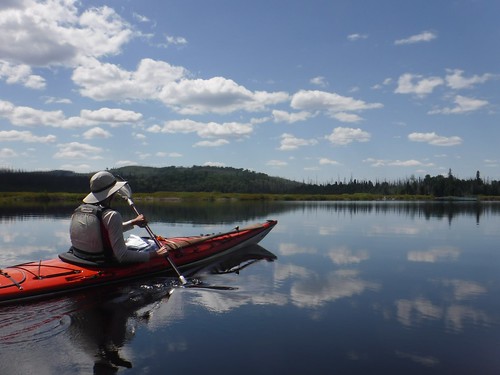We began our day by carrying our things along the road around the dam. We took the boats on the cart, and switched off with hauling because even with the wheels they got heavy. We filled the duffle bag with dry bags, hauled it the distance, and then returned with it to the take-out for another load.
The heaviest bags we carried separately from the duffle, one in each hand. We’d stopped to rest and eat raspberries along the way.
The dam had not been marked on our map and the shape of the river changed since its construction. We found dead ends and worked our way back around islands and through swiftly flowing passages before approaching a large bridge across the river.
To our right, a group of First Nations people sat in the woods near a giant birch bark canoe. We waved.
Under the bridge, the current flowed strongest, but with a little heaving we made it up the river.
The Atikamekw town of Wemotaci lay to the right, according to the map, along the water. But we didn’t see any houses, let alone docks to take out at, just woods. At one point, through the woods, we saw some large commercial buildings. We couldn’t make out what they were. We passed what looked like a path down to the water that continued through tall grasses in the river. Not ideal, we kept going.
We turned around a corner and saw the shore stretch out ahead. Aside from a single house above a low cliff, we saw only woods. We turned back around the bend and took out at the path. We found some picnic tables in a field behind a school, closed for the summer.
Richard told us we’d need to ask permission to be in the First Nation’s town, and wrote us a note asking. The Atikamekw people have preserved their native language, and were taught French in school. Very few of them speak English.
But we found a local, showed him our note asking for permission to stay, and were given an affirmative nod. We then set out for a supermarket, wifi, toilet paper, and water.
The town had a small market. We bought pasta sauce, vegetables, and ibuprofen for my swollen elbow. We tried to buy a single roll of toilet paper, but they wouldn’t sell us one, only a bunch. We asked if we bought a bunch, could we then return the rolls we didn’t need. Maybe they could be given to other customers.
The manager said no. She gave us a roll from their bathroom.
The reserve had houses and paved roads like other small towns do. Perhaps the houses seemed a little more mass produced than most.
A drunk spoke to us for a while, but we didn’t understand what he said. He managed to ask for weed in English. We didn’t have any.
A white psychologist visiting the community gave us the community center’s wifi password. And while Erin and I caught up on the events of the world and communicated with our families, a local kid, Estobon, who spoke English, introduced himself.
His mother, Atikamekw, grew up in the town. His father, French Canadian, grew up in Trois Rivieres, and worked for the Canadian forestry service based on the reserve. With their pickup truck, we moved our more valuable gear to their house where it would be safe for the night. We then settled in to sleep in their guest trailer.
We showered, enjoyed hot tea, warm beds, and generous hospitality.

No comments:
Post a Comment